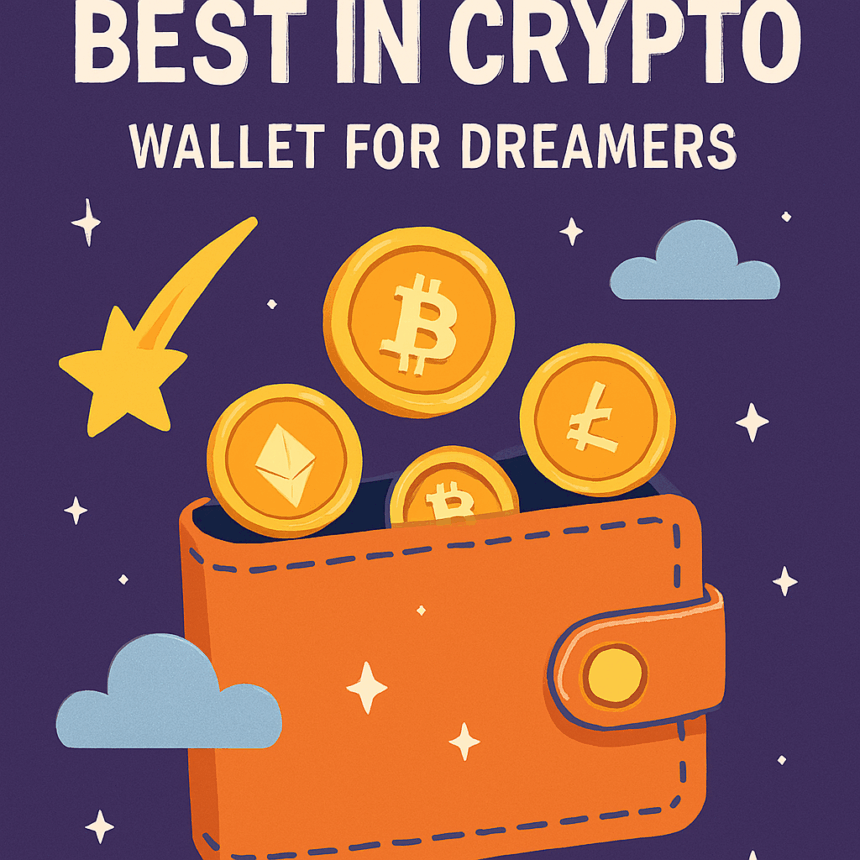In this article, I will cover the Best in Crypto Wallet for Dreamers, ZenGo, the new keyless wallet that emphasizes security and ease of use.
ZenGo is perfect for both novice and expert traders, as it removes the need for seed phrases, recovers biometrically, supports numerous cryptocurrencies, and thus eliminates worry for traders.
Key Features & Best in Crypto Wallet for Dreamers
| Wallet Name | Key Features |
|---|---|
| ZenGo | 3FA security, biometric recovery, Web3 firewall |
| Ledger Nano X | Bluetooth-enabled, supports 5,500+ coins, military-grade security |
| Trezor Model T | Open-source, touchscreen, supports DeFi and NFTs |
| MetaMask | Browser/mobile access, NFT support, DeFi integration |
| Trust Wallet | Supports 70+ blockchains, NFT viewer, staking options |
| Exodus Wallet | Beautiful UI, 250+ assets, built-in exchange |
| Atomic Wallet | Anonymous swaps, staking, supports 300+ coins |
| Coinbase Wallet | Easy dApp access, NFT gallery, secure recovery options |
| Crypto.com DeFi | DeFi dashboard, staking, NFT marketplace |
| Cypherock X1 | Military-grade cold storage, multi-sig recovery, seedless architecture |
1. ZenGo
ZenGo is a non-custodial wallet launched in 2018 that focuses on mobile use, security, and ease of use. It supports 70 cryptocurrencies, Bitcoin, Ethereum, and Polygon, and is connected with NFT and DeFi platforms.
ZenGo is an Israeli company that employs Multi-Party Computation (MPC) cryptography which eliminates the use of seed phrases, making ZenGo more secure. ZenGo does not charge wallet fees, only network gas fees, but does offer premium features that come with a pro subscription.
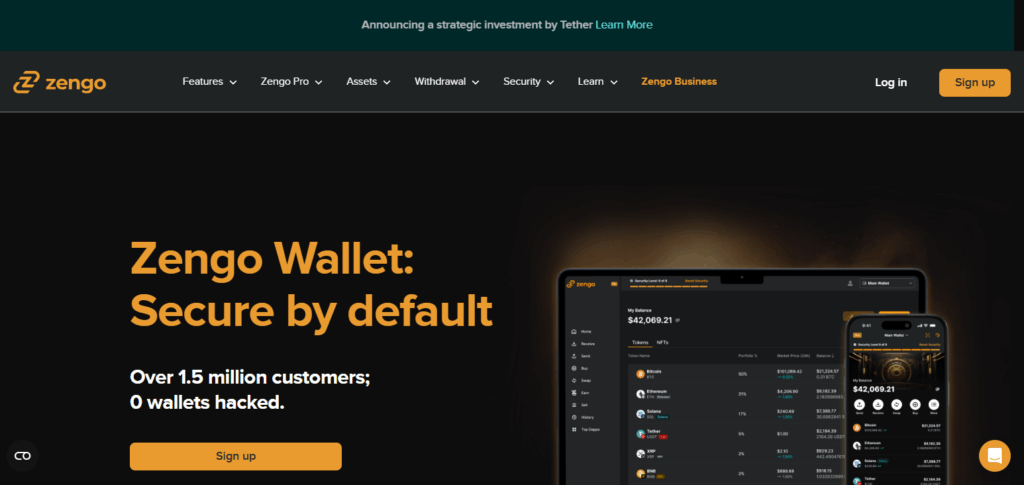
Customer support is offered in-app 24/7, allowing access to live agents. ZenGo is considered the best crypto wallet because its keyless and interface designs are dreamlike, allowing for digital assets to be managed effortlessly and securely.
ZenGo biometrically and cloud-backed recovery systems are an asset to the crypto world for both beginners and enthusiasts.
ZenGo
Pros:
- Enhanced protection against theft or loss due to keyless MPC security.
- Onboarding and recovery are streamlined (no seed phrase required).
- Built-in exchange and staking options provided within the app.
- Phishing and biometric login protections.
Cons:
- Advanced users who favor control via seed phrase may find the custody model lacking.
- Minimal integration with advanced DeFi tools compared to MetaMask.
- Limited support for desktops.
- Trust assumptions are more nuanced due to reliance on their backend for parts of the MPC protocol.
2. Ledger Nano X
Ledger Nano X is a premium hardware wallet launched in 2019 with support for over 5,500 cryptocurrencies, Bitcoin, Ethereum and stablecoins included. Having Bluetooth and a secure chip as well as Ledger Live for software portfolio management, the device is quite advanced.
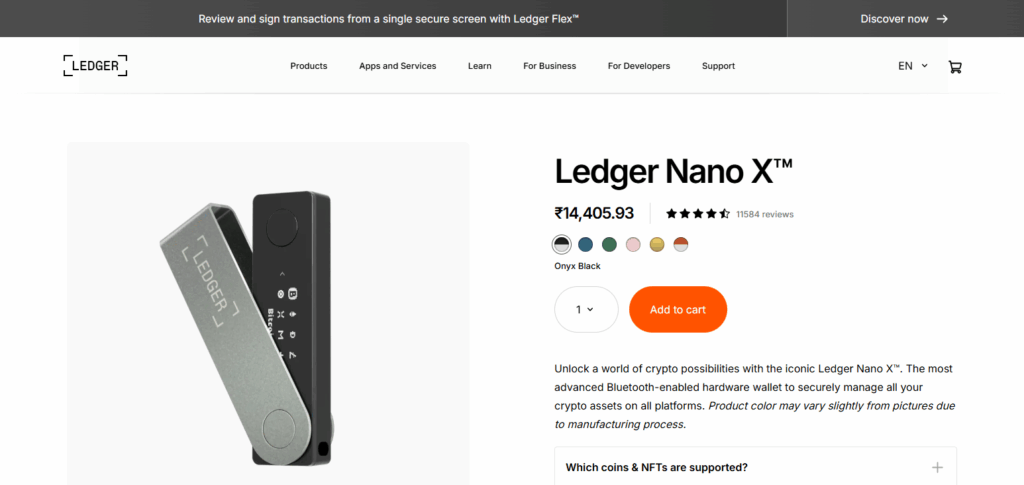
The device charges a one time purchase fee of around 149 dollars with no ongoing costs. Based in France, Ledger has global support and offers multilingual live and email chat resources. The wallet’s security is unmatched and works well for both beginners and professional traders.
Many users searching for unique options often compare it to Best in Crypto Wallet for Dreamers – ZenGo which focuses on keyless security. Those who prefer cold storage, mobility, and advanced encryption lean towards the Ledger Nano X.
Ledger Nano X
Pros:
- Secure element protects against offline key theft (cold wallet).
- Integrates with Ledger Live, giving access to thousands of assets.
- Keys can remain offline due to Bluetooth functionality.
- Strong community trust and history of reliability.
Cons
- Requires purchase of hardware.
- Bluetooth capability increases vulnerability relative to fully offline models.
- Recovery dependent on seed phrase (user error).
- Somewhat counterintuitive for beginners lacking guidance.
3. Trezor Model T
The Trezor Model T is a touch-screen hardware wallet supporting over 1,400 cryptocurrencies. It was launched in 2018 by SatoshiLabs located in the Czech Republic. Model T is famously known for its open-source firmware, its security protocols, and its touch screen interface.
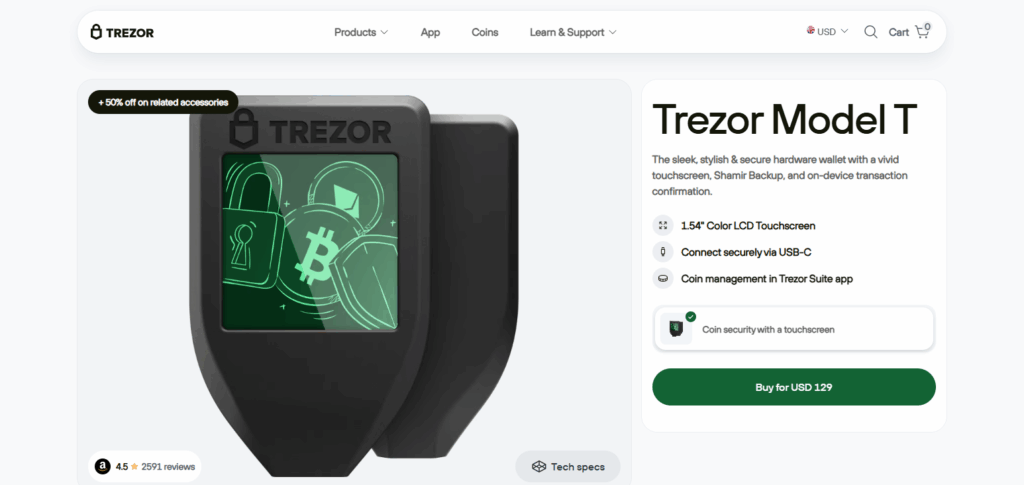
Users pay a one-time purchase price of about 219 dollars and enjoy storage with no fees. However, fees apply for transactions. Trezor offers email, knowledge base, and community forum support.
Trezor’s interface is user-friendly for all investors. Czech in comparison, many enthusiasts note the Best in Crypto Wallet for Dreamers – ZenGo for its seedless recovery approach. Trezor Model T remains a trusted choice for those seeking transparent, auditable software and strong offline protection for digital assets.
Trezor Model T
Pros:
- Use of open-source firmware and known security model.
- Enhanced user experience with confirmations through color touchscreen.
- Strong offline (cold storage) digital asset protection with auditable processes.
- Allows for additional integrations with other services.
Cons:
- Investment will be higher due to the fixed cost.
- Doesn’t allow mobile Bluetooth connections (only via USB).
- Recovery uses only the backup seed phrase (exposed if not securely stored).
- Some sophisticated functionalities dependent on other external programs untethered to the main device software.
4. MetaMask
MetaMask is a software crypto wallet as well as a browser extension that supports Ethereum, ERC-20 tokens, as well as other compatible blockchains. Found in 2016 by Consensys, it is region locked to the US. available globally. Users only pay gas fees, with optional swaps available for a service fee.
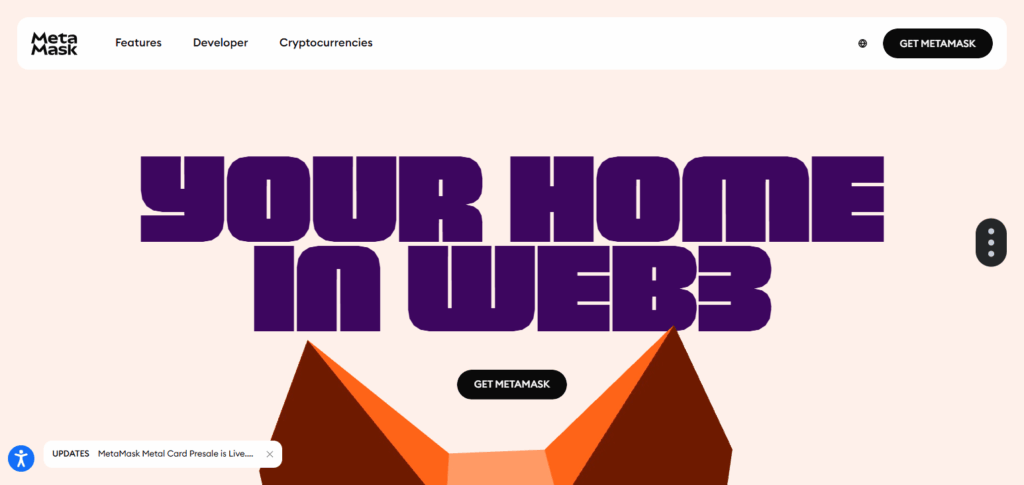
They offer customer support through ticketing, community forums, and guides. MetaMask is popular for its DeFi industry and NFT trading, as well as with developers due to its Web3 integration. For mobile users, ZenGo is also regarded as a self-custody wallet that has a biometric login, thus motivating many to call it the Best in Crypto Wallet for Dreamers.
Users are empowered with total control of their keys, giving them the ability to move tokens with ease and making MetaMask a popular choice for gateways to decentralized applications.
Metamask
Pros:
- Excellent integration with Web3 and DApps on Ethereum and its layer 2’s.
- Have no cost aside from gas fees; customizable.
- Well adopted and developer friendly with plugins for added functionalities.
- Available as a mobile app and browser extension.
Cons:
- Full and sole responsibility of the seed phrase.
- Users can be led to harmful actions from the smart-contract and swap UI; approving malicious contracts.
- Gas fees on Ethereum are often exorbitant and service fees on swaps are additional.
- Users may be confused by the lack of transparency on centralized swap aggregator fees.
5. Trust Wallet
Trust Wallet is a mobile wallet that was established in 2017. Later in 2018, Binance acquired it. Currently, it supports over 4.5 million assets from 65 blockchains. It’s free to use, with the only cost being the network fees.
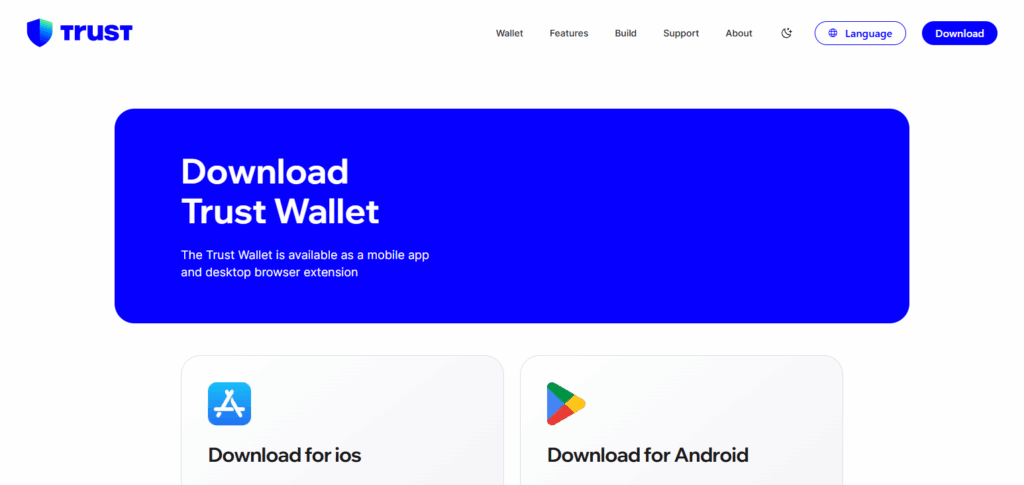
Trust Wallet has a global reach and helps users with the support section, guides, and FAQs that are available in multiple languages. For crypto users, Trust Wallet is a good option as it supports versatile features like staking, DEX in-app trading, and NFT storage.
Trust Wallet is often referred to as the Best in Crypto Wallet for Dreamers – ZenGo because of the ease it offers to users and backup options availabe. Trust Wallet is a mobile crypto wallet trusted and used worldwide because of the open-source security features and user friendly, mobile interface.
Trust Wallet
Pros:
- A mobile-friendly multi-chain wallet with NFT and DEX in-app access, as well as staking.
- Non-custodial; private keys are controlled on the device.
- Easy backup via seed phrase and Binance ecosystem integration.
- No cost apart from network fees.
Cons:
- Basic seed phrase backups contribute to the phrase’s management risks with no other advanced alternatives.
- Phone only design hampers desk work.
- Swap functions may contain hidden slippage or spreads from other service providers.
- Customer support is mostly self-service; resolution varies.
6. Exodus Wallet
Exodus Wallet started operating in 2015, in the United States, and it allows users to store and use over 300 cryptocurrencies, including Bitcoin, Ethereum, and Solana. While it is free to use, Exodus charges a spread on in-wallet swaps.
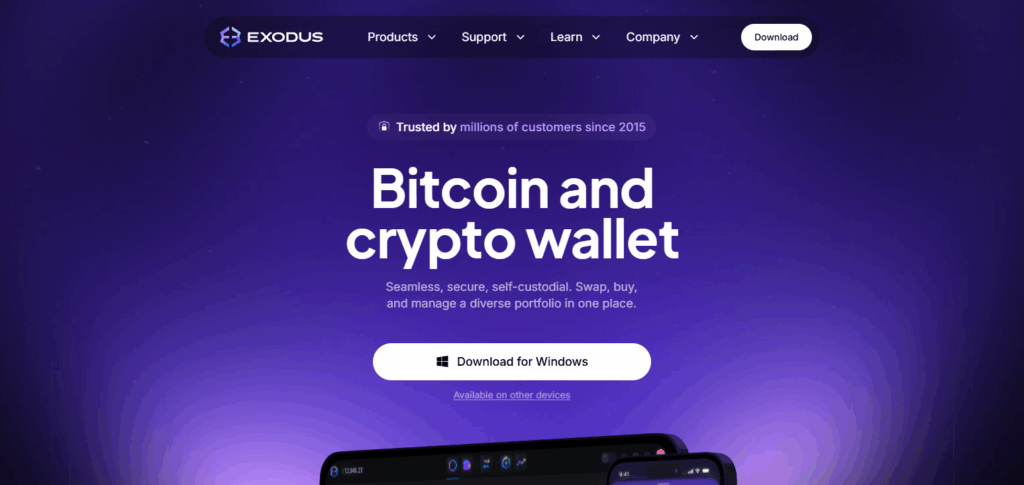
Exodus offers mobile and desktop versions, as well as Trezor hardware integration, which simplifies asset management. Human support is offered 24/7 via email and live chat, and is known to respond quickly.
Midway in comparisons, some users prefer the Best in Crypto Wallet for Dreamers – ZenGo for its recovery system and security model. Exodus is best known for its beautiful interfaces and easy portfolio tracking, as well as providing integrated exchange services while still allowing users to control their private keys.
Exodus Wallet
Pros:
- Marks a well-designed interface and experience for both desktop and mobile; facilitates easy portfolio monitoring.
- Integrates swaps and fiat on-ramps for a one-stop shop.
- Non-custodial wallets that retain private keys on the device.
- Well-known for responsive customer support.
Cons:
- Less transparent swap fees.
- Closed-source components limit auditability.
- Recovery still seed-phrase based.
- Limited customization options as noted by some advanced users.
7. Atomic Wallet
Launched in 2018 and based in Estonia, Atomic Wallet offers support for more than 500 cryptocurrencies and provides atomic swaps for selected pairs. The wallet can be downloaded for free, but there are network fees and optional exchange fees.
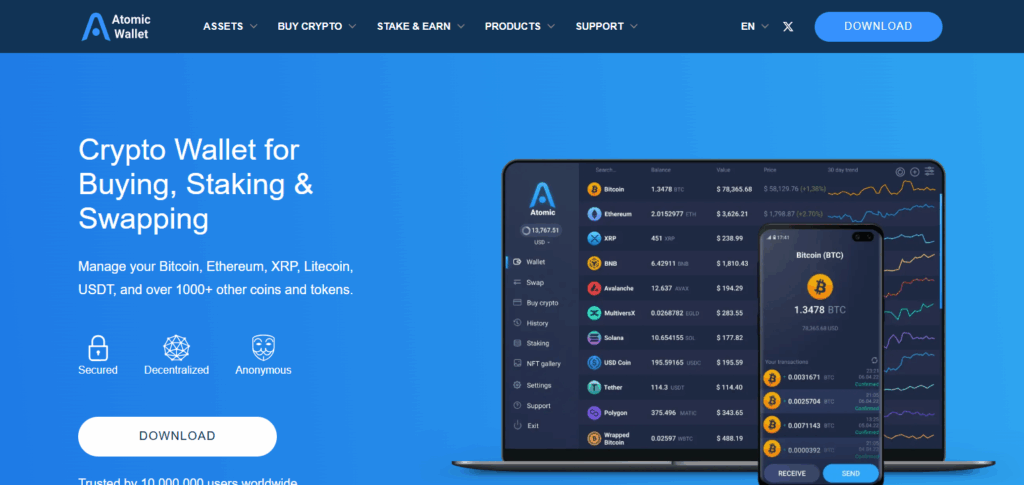
Users can access in-built staking, buy crypto via bank cards, and enjoy multi-device access. The decentralized nature of the wallet guarantees the user’s private key ownership. Support is available through email, social media, and other platforms.
Users in the middle often compare it with Best in Crypto Wallet for Dreamers – ZenGo, which features advanced keyless security. Atomic Wallet is preferred by crypto traders who value privacy and prefer non-custodial accounts.
Atomic Wallet
Pros:
- Significant support for coins and atomic swap for select pairs.
- Staking and exchange with custodial control.
- Use on mobile and desktop freely.
- Network and exchange fees only.
Cons:
- Exchange routing adds centralized control, leading to variable spreads.
- Recovery options via seed phrase come with risk.
- Response to support tickets can take unfixed amounts of time.
- Less prominent scrutiny from peers may lower the perceived security of a hardware wallet.
8. Coinbase Wallet
Coinbase Wallet is a product of Coinbase Inc. which is a cryptocurrency exchange based in the U.S. It was launched in 2018. The Coinbase Wallet is a non custodial wallet which supports thousands of cryptocurrencies, NFTs, and provides DeFi access.
The Coinbase Wallet is free of charge aside from any blockchain network fees. The wallet is linked to the Coinbase exchange and allows users to control their keys fully. Coinbase offers email, live chat, and help center articles as a form of customer support.
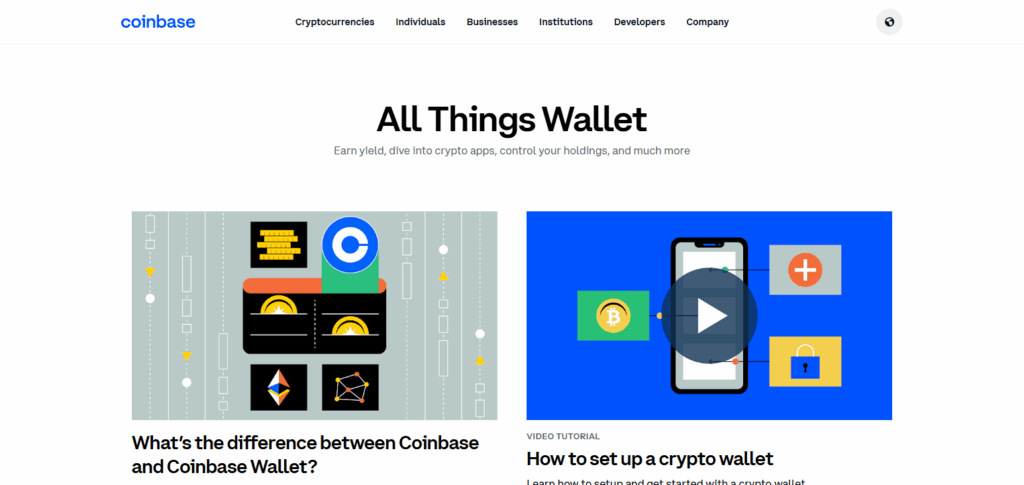
It is a perfect choice for DeFi and NFT aficionados due to its integration with Web3 apps. Many compare it mid-analysis to the Best in Crypto Wallet for Dreamers – ZenGo, praised for its seamless intuitive interface design and secure recovery options.
Coinbase Wallet’s brand trust, in combination with support of several chains, makes it stand out to both novices and seasoned users of cryptocurrency.
Coinbase Wallet
Pros:
- Instantly recognizable name and good trust; Use of Web3 and NFTs.
- Keys are self-custodial as users separate from Coinbase exchange.
- Multi-chain support alongside broader Coinbase ecosystem.
- Tools and workflows for instruction.
Cons:
- Risks associated with seed phrase custody.
- Users incur additional expenses due to swap fees and network fees.
- There may be a perception confusion regarding custodial Coinbase accounts as compared to self-custodial wallets.
9. Crypto.com DeFi Wallet
Launched in 2018 as part of Crypto.com, the DeFi Wallet is a self custody wallet enabling users to hold more than 700 tokens from various ecosystems. Maintaining the account is free, and the only charges incurred are network fees for withdrawals.
The wallet supports yield farming, crypto stakes, and allows seamless transfers to the Crypto.com app. They provide customer support through in-app chat, email, and an extensive in-app FAQ.
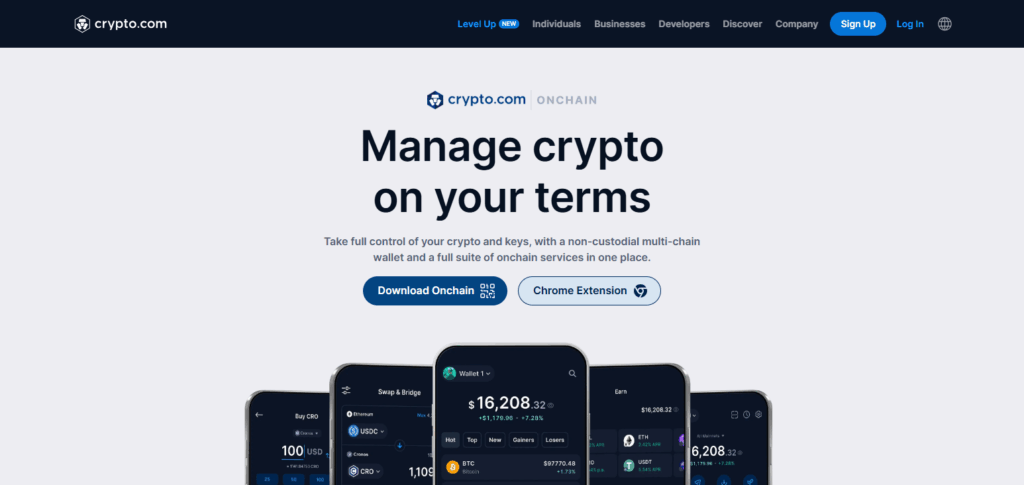
Comparatively, some users are more inclined to consider the Best in Crypto Wallet for Dreamers – ZenGo due to its more appealing and simple for the less experienced users keyless access.
Crypto.com DeFi Wallet is tailored for users who wish to exercise full control over their digital assets and desire sophisticated DeFi functionalities accompanied by safe, private custody in a simple, intuitive wallet interface.
Crypto.com DeFi Wallet
Pros:
- The mobile application offers non-custodial features and enables DeFi integrations (yield, staking, NFTs) within the mobile application.
- Supports many tokens across chains; offers biometric security.
- Large ecosystem support (Crypto.com) facilitates greater adoption.
- Access and use of the application does not incur custody fees, only on-chain expenses.
Cons:
- UX used within DeFi applications may be complex for newcomers.
- Users depend on the seed phrase and may be locked out.
- Users may become confused in the decentralized ecosystem due to the integration with the centralized ecosystem.
- Users may experience variable support across many different channels.
Conclusion
For crypto dreamers desiring a mix of ease, security, and modern user experience, Best in Crypto Wallet for Dreamers – ZenGo’s mobile-first, intuitive design and recovery features, alongside its keyless MPC architecture, removes the need for burdening seed phrases.
It is favorable for those seeking to delve into the crypto world without the need to deal with intricate key management, as it still provides non-custodial control. ZenGo may be paired with a hardware wallet such as Ledger or Trezor for cold-storage backup, which is best suited for serious long-term holders or those with large vaults.
Essentially, ZenGo provides a seamless blend of risk mitigation and user-friendliness for crypto dreamers, supporting easy exploration while enabling risk averse users to later incorporate traditional cold storage for added security.
FAQ
What is ZenGo and why is it called the Best in Crypto Wallet for Dreamers?
ZenGo is a mobile-first, non-custodial crypto wallet that uses multi-party computation (MPC) instead of a single private key or seed phrase. It’s ideal for “dreamers” who want secure, simple, and intuitive access to crypto without the stress of managing recovery phrases.
Which cryptocurrencies does ZenGo support?
ZenGo supports over 120 cryptocurrencies including Bitcoin, Ethereum, stablecoins, and popular ERC-20 tokens, with ongoing additions.
Does ZenGo charge fees?
Creating and using ZenGo is free. You only pay network (blockchain) fees when sending crypto, and a service fee if using its built-in exchange.
Is ZenGo available worldwide?
Yes, ZenGo is available in most countries, though some features like buying/selling crypto depend on regional regulations.
How does ZenGo handle security without seed phrases?
ZenGo uses MPC technology, splitting the key between the user’s device and ZenGo’s servers. Even if one part is compromised, funds remain safe. Recovery is done through biometric authentication and cloud backup.


